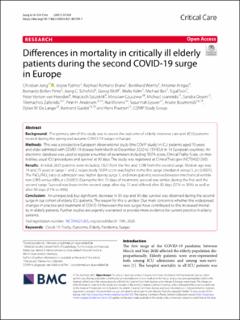Differences in mortality in critically ill elderly patients during the second COVID‑19 surge in Europe
Jung, Christian; Fjølner, Jesper; Bruno, Raphael Romano; Wernly, Bernhard; Artigas, Antonio; Pinto, Bernardo Bollen; Schefold, Joerg C.; Wolf, Georg; Kelm, Malte; Beil, Michael; Sviri, Sigal; van Heerden, Peter Vernon; Szczeklik, Wojciech; Czuczwar, Miroslaw; Joannidis, Michael; Oeyen, Sandra; Zafeiridis, Tilemachos; Andersen, Finn H.; Moreno, Rui; Leaver, Susannah; Boumendil, Ariane; De Lange, Dylan W.; Guidet, Bertrand; Flaatten, Hans
Journal article, Peer reviewed
Published version

Åpne
Permanent lenke
https://hdl.handle.net/11250/2834428Utgivelsesdato
2021Metadata
Vis full innførselSamlinger
- Department of Clinical Medicine [2066]
- Registrations from Cristin [9791]
Sammendrag
Background: The primary aim of this study was to assess the outcome of elderly intensive care unit (ICU) patients treated during the spring and autumn COVID-19 surges in Europe.
Methods: This was a prospective European observational study (the COVIP study) in ICU patients aged 70 years and older admitted with COVID-19 disease from March to December 2020 to 159 ICUs in 14 European countries. An electronic database was used to register a number of parameters including: SOFA score, Clinical Frailty Scale, co-morbidities, usual ICU procedures and survival at 90 days. The study was registered at ClinicalTrials.gov (NCT04321265).
Results: In total, 2625 patients were included, 1327 from the first and 1298 from the second surge. Median age was 74 and 75 years in surge 1 and 2, respectively. SOFA score was higher in the first surge (median 6 versus 5, p < 0.0001). The PaO2/FiO2 ratio at admission was higher during surge 1, and more patients received invasive mechanical ventilation (78% versus 68%, p < 0.0001). During the first 15 days of treatment, survival was similar during the first and the second surge. Survival was lower in the second surge after day 15 and differed after 30 days (57% vs 50%) as well as after 90 days (51% vs 40%).
Conclusion: An unexpected, but significant, decrease in 30-day and 90-day survival was observed during the second surge in our cohort of elderly ICU patients. The reason for this is unclear. Our main concern is whether the widespread changes in practice and treatment of COVID-19 between the two surges have contributed to this increased mortality in elderly patients. Further studies are urgently warranted to provide more evidence for current practice in elderly patients.
